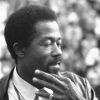calsfoundation@cals.org
Bobby James Hutton (1950–1968)
At the age of sixteen, Robert James (Bobby) Hutton was the first recruit of the Black Panther Party. He participated in the march on the California State Capitol in 1967, and his death in 1968 became a rallying cry for the Black Panther movement. A literacy campaign was later started in his honor.
Bobby Hutton was born on April 21, 1950, in Jefferson County, the son of John D. Hutton and Dolly Mae Mitchner-Hutton. He was among the youngest of several siblings. The family lived in the Pot Liquor area of Jefferson County. In 1953, when he was about three years old, his family moved to Oakland, California, after being visited by nightriders.
In December 1966, Hutton was the first to join the newly formed Black Panther Party for Self Defense, a revolutionary African-American organization that had been organized by Huey P. Newton and Bobby Seale. At sixteen, he was the youngest member. He joined the Black Panther Party because he wanted to make a difference in his community and because he believed in the Black Panther Party’s Ten-Point Program. On May 2, 1967, he was present when several Black Panther Party members made national headlines by appearing armed at the California State Capitol in Sacramento to protest the Mulford Act, which prohibited the carrying of firearms in any public place. Hutton and several others were later arrested several blocks away at a gas station. On May 22, 1967, he was again arrested for violating an 1887 law against having guns on grounds adjacent to a jail.
On April 6, 1968, Hutton was in a carload of Black Panther Party members who were confronted by Oakland police officers; two officers were shot. Later, at a home at 1218 28th Street, Eldridge Cleaver and Hutton, in an incident connected to the earlier shooting, engaged in a ninety-minute shootout with police officers. It was reported that Hutton was shot more than twelve times after he had already surrendered and stripped down to his underwear to prove he was not armed. However, police reports stated that Hutton was wearing a long overcoat and that his hands could not be seen when he exited the building. The death of Hutton was a major event in the party’s history, angering the Black Panthers and becoming the rallying cry for the movement.
On April 12, 1968, Hutton’s funeral was held at the Ephesian Church of God in Berkeley, California. In 1968, Country Joe and the Fish dedicated the album Together to Hutton. He is also mentioned in the following songs: Tupac Shakur’s “Ghetto Gospel,” (released posthumously in 2004), Smif-N-Wessun’s “Still Fighting,”(2007), and Bhi Bhiman’s “Up in Arms.” (2007). His image appears on the cover of the single “Star” by Primal Scream (1989). The Commemoration Committee for the Black Panther Party later organized the Lil’ Bobby Hutton Literacy Campaign. Every year in April since Hutton’s death, family and friends have held a memorial service at DeFremery Park, which, in 1998, was renamed Bobby Hutton Park by the City of Oakland, California.
For additional information:
“Bobby Hutton.” A Huey P. Newton Story. Public Broadcasting Service. http://www.pbs.org/hueypnewton/people/people_hutton.html (accessed March 1, 2022).
“California Black Panthers Demand Right to Bear Arms.” Pine Bluff Commercial. May 3, 1967, pp. 1–2.
Seale, Bobby. Seize the Time: The Story of the Black Panther Party and Huey P. Newton. New York: Random House, 1968.
Gwendolyn L. Shelton
Pine Bluff, Arkansas
 Black Power Movement
Black Power Movement Civil Rights and Social Change
Civil Rights and Social Change World War II through the Faubus Era, 1941 through 1967
World War II through the Faubus Era, 1941 through 1967



Comments
No comments on this entry yet.